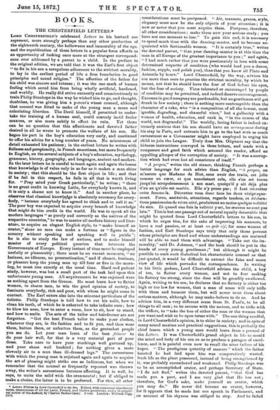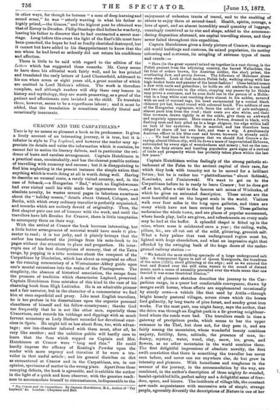BOOKS.
THE CHESTERFIELD LETTERS.*
a Letters Written by Lord Chesterfield to his Son. Edited, with occasional elucidatory notes, translations of all the Latin, French, and Italian quotations, and a biographi- cal notice of the Author, by Charles Stokes Carey. 2 vols. London : William Tegg. 1872.
considerations must be postponed. "Air, manners, graces, style, elegancy must now be the only objects of your attention ; it is now or never that you must acquire them. Postpone, therefore, all other considerations; make them now your serious study ; you have not one moment to lose." To gain this end, it is necessary to spend much time with the dancing-master. and to become ac- quainted with fashionable women. "It is certainly true," writes the devoted parent, "that your dancing-master is at this time the man in all Europe of the greatest importance to you ; " and again, "I had much rather that you were passionately in love with some determined coquette of condition (who would lead you a dance, fashion, supple, aud polish you), than that you knew all Plato and Aristotle by heart." Lord Chesterfield, by the way, advises his sou more than once to practise the strictest morality, by which he means, not that he should have the fear of God before his eyes, but the fear of society. Vices tolerated or encourage I by people of condition may be permitted, and indeed deserve encouragement. Excesses in gocd company are pardonable, but no gentleman will get drunk in low society ; there is nothing more contemptible than the character of a rake, who "is a composition of all the lowest, most ignoble, degrading, and shameful vices," but a gallantry with a woman of health, education, and rank is, "in the course of the world, not disgraceful." The worldly, loving father is indeed ex- tremely anxious that his son should have an arrangement during his stay in Paris, and entreats him to go to the bad with as much earnestness as a Covenanter might have employed in urging his child to join the League. Truly does Mrs. Oliphant say that the hideous instructions conveyed in these letters, and made with a composure and good faith which astound the reader, afford an appalling glimpse of the corruption of society. "It was a corrup- tion which had even lost all conscience of itself."
"A propos," writes the old sinner, thinking French perhaps a better language for such advice than English, "it propos, on m'assure que Madame de Blot, sans avoir des traits, est jolie comme un coetir, et que nonobstant cela, elle s'en est tenue jusqu'ici scrupuleu.sement It son man, quoiqu'il y ait cleja plus d'un an qu'elle est merle°. Elle n'y pease pas; il faut decrotter cette femme-lk. Decrottez vous done tous les deux recipraque- ment. Force, assiduites, attentions, regards tendres, et declara- tions passionnees de votre cote, produiront an moms quelque velleite du sien. Et quand tine fois la velleite y est, lea ceuvree ne soot pas loin." This is but one passage out of several equally detestable that might be quoted from Lord Chesterfield's letters to his son, in which he urges him, for the sake of improving his manners, to have a real passion, or at least en gore vif, for some woman of fashion, and Earl Stanhope says truly that only those persons whose principles are fixed and whose understandings are matured will be able to read them with advantage. "Take out the im- morality," said Dr. Johnson, "and the book should be put in the hands of every young gentleman ;" but although it might be possible to omit such diabolical but characteristic counsel as that just quoted, it would be difficult to extract the false and mean view of life which pervades the correspondence. In writing to his little godson, Lord Chesterfield advises the child, a boy of ten, to flatter every woman, and not to fear making his flattery too strong, since the dose will be greedily swallowed. Again, writing to his son, he declares that no flattery is either too high or too low for women, that a man of sense will only trifle with them and humour them, but will never trust them about serious matters, although he may make-believe to do so. And he advises him, in a very different sense from St. Paul's, to be all things to all men ; to be serious with the serious, and to trifle with the triflers to "take the hue of either the man or the woman that you want and wish to be upon terms with." The one thing needful, in Lord Chesterfield's opinion, is to shine in society; and in spite of many sound maxims and practical suggestions, this is probably the chief lesson which a young man would learn from a perusal of the Letters. It was Chesterfield's grand object in life to mould the mind and body of his son so as to produce a paragon of excel- lence, and it is painful even now to recall the utter failure of his hopes. "The prodigious quantity of manure" which the father boasted he had laid upon him was comparatively wasted. Such life as the plant possessed, instead of being strengthened by it, was probably encumbered and weakened. Philip Stanhope was to be an accomplished orator, and perhaps Secretary of State. "I do not find," writes the devoted parent, "that God has made you a poet, and I am very glad that He has not ; therefore, for God's sake, make yourself an orator, which you may do." He never did become an orator, however, for it appears that he made but one speech in Parliament, and on account of his shyness was obliged to stop. And he failed in other ways, for though he became "a wan of deep learning and sound sense," he was "utterly wanting in what his father so highly prized,—the Graces," and the highest post he obtained was that of Envoy to Dresden. Philip Stanhope died before he was forty, leaving his father to discover that he had contracted a secret mar- riage. Long before this event the light of the Earl's life must have been quenched, the hopes he had so fondly cherished destroyed, but. it cannot but have added to his disappointment to know that the son whom he had loved so ardently did not return his confidence and affection.
There is little to be said with regard to the edition of the Letters which has suggested these remarks. Mr. Carey seems to have done his editorial work fairly well, and he has printed and translated the early letters of Lord Chesterfield, addressed to his son when seven or eight years old, a great number of which are omitted in Lord Mahon's edition. The work is therefore complete, and although readers will skip these easy lessons in history and mythology, they are worth preserving, as a proof of the patient and affectionate care lavished on the child. To translate them, however, seems to be a superfluous labour ; and it must be added, that the translation is sometimes absurdly literal and occasionally inaccurate.



































 Previous page
Previous page